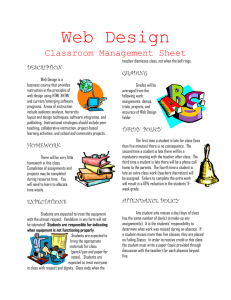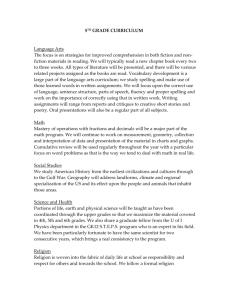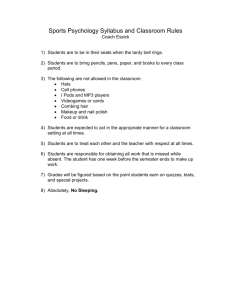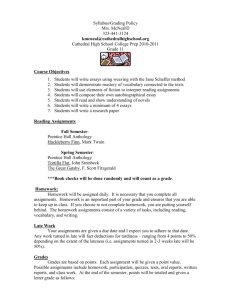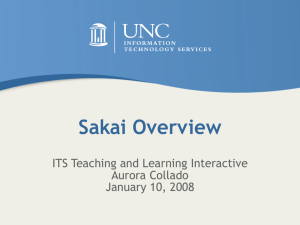Software Engineering Laboratory
advertisement
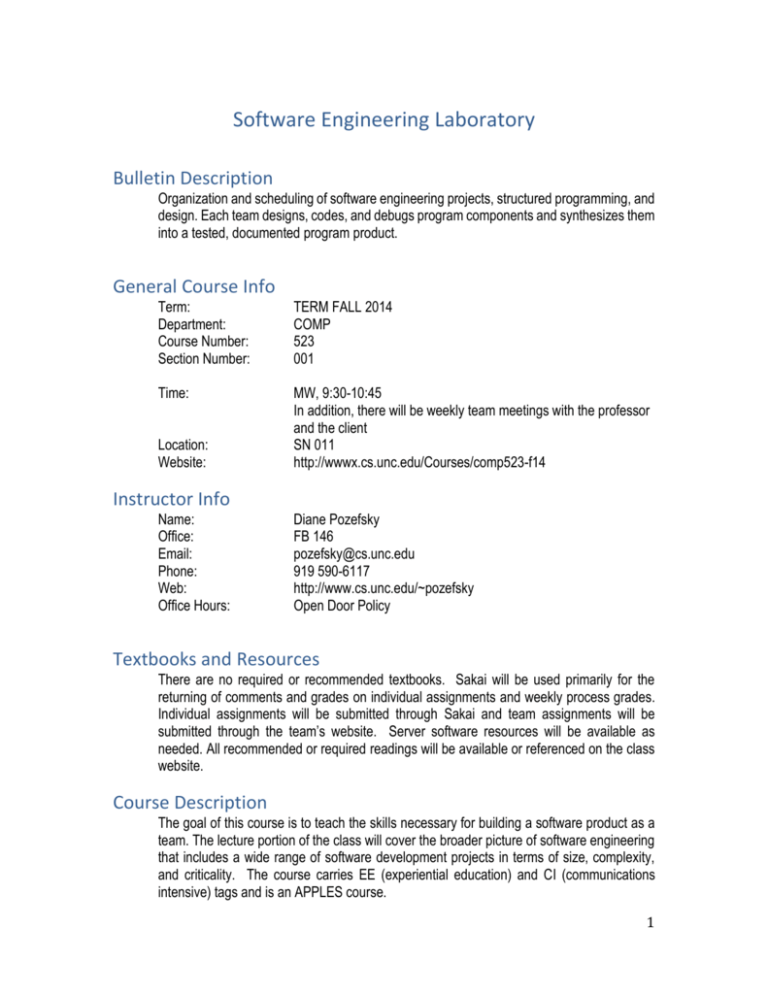
Software Engineering Laboratory Bulletin Description Organization and scheduling of software engineering projects, structured programming, and design. Each team designs, codes, and debugs program components and synthesizes them into a tested, documented program product. General Course Info Term: Department: Course Number: Section Number: TERM FALL 2014 COMP 523 001 Time: MW, 9:30-10:45 In addition, there will be weekly team meetings with the professor and the client SN 011 http://wwwx.cs.unc.edu/Courses/comp523-f14 Location: Website: Instructor Info Name: Office: Email: Phone: Web: Office Hours: Diane Pozefsky FB 146 pozefsky@cs.unc.edu 919 590-6117 http://www.cs.unc.edu/~pozefsky Open Door Policy Textbooks and Resources There are no required or recommended textbooks. Sakai will be used primarily for the returning of comments and grades on individual assignments and weekly process grades. Individual assignments will be submitted through Sakai and team assignments will be submitted through the team’s website. Server software resources will be available as needed. All recommended or required readings will be available or referenced on the class website. Course Description The goal of this course is to teach the skills necessary for building a software product as a team. The lecture portion of the class will cover the broader picture of software engineering that includes a wide range of software development projects in terms of size, complexity, and criticality. The course carries EE (experiential education) and CI (communications intensive) tags and is an APPLES course. 1 Target Audience This course is intended for upper class majors with an interest in building software for practical use. Students are expected to have enough experience to be able to learn new software systems on their own and to design a system using techniques and principles learned in other courses. This is an ideal course for those interested in getting real world experience in building software and communicating with others. Prerequisites COMP 410 and 411 plus two additional COMP courses numbered 426 or higher. The additional two courses will ideally cover software tools, techniques or principles. Goals and Key Learning Objectives At the end of the course, each student will have experienced all aspects of a software development project, including working with a client to define goals and priorities designing a system scheduling and planning a multi-person project effective communications running meetings writing technical documentation preparing web content writing and testing code deploying the system public presentations Disclaimer The professor reserves to right to make changes to the syllabus, including assignment and project due dates. These changes will be announced as early as possible and will be reflected on the course website. If there are discrepancies between this syllabus and the website, the website is considered the definitive information. Course Requirements The essence of the course is the faculty-coached team project. Teams of 2-4 students spend the semester negotiating, estimating, scheduling, specifying, coding, debugging, integrating, documenting and testing a substantial programming product. Each project has a real client that is expecting a completed project. Each document will be submitted to the professor in draft form and will be revised based on comments. In addition, documentation needs to be maintained to reflect changes in the product that is being produced. There will be no written exams; there will be individual assignments given to cover the key concepts of the course that are not well reinforced through the project and to expose you to the literature in the field. 2 There are a lot of new things happening in the field of software engineering that you are not exposed to within the department's curriculum. Each team will present a technology from a provided list or one that they are using that has not been taught in other classes. Teams will give a 30-45 minute presentation to the class. There is a lot of material that needs to be covered early in the semester and I am likely to experiment with video lectures for content that I can’t get to you in an appropriate time. Project grades are based on code, documentation, ambition, effort, teamwork, and accomplishment. The final exam is a presentation of the end product. Key Dates Project demos will be September 29-October 1 and November 5-10. Essays will be due September 28, November 2 and November 23. Key deliverables for the projects are the functional specification, due September 7 and the manuals and design documentation, final versions due December 6. This is also the day that the final code is due and the final presentation given. Initial versions of these documents are due earlier. Grading Criteria Overall breakdown Project 75% Technology talk 15% Essays 10% Project I compute a single grade for the project, based on the following percentages: Process 25% Code 25% Documentation 20% Final Presentation 5% I then apply an individual contribution multiplier for each person. This value is based on my observations as well as the evaluations by your client, any consultants, and your peers. The multiplier ranges from .7 to 1.1, but a value above 1 is only used in exceptional cases. Basically, I do not believe that you should be able to get a better grade than the product you produced. A few more details: Process includes whether you are interacting appropriately as a team, with me, and with your client. Are you addressing issues as they arise? It includes professionalism in your dealings with your client and your professor and whether you are usually on time with deliverables or habitually late. It includes your web site and the materials that you produce as steps to produce the other artifacts. I will be giving you process grades every week. You will receive individual and 3 team grades. Key considerations for the grade are whether you meet your milestones, you are adapting your process as you learn, and whether you are working well as a team. The code grade covers function, correctness and readability. The three components are equally important. Have you met the primary requirements? How many bugs was I able to find? I will do a random review of the code that you produce. I expect to be able to understand it. This includes web pages as well as other code that you write. The documentation covers the formal deliverables: the functional spec, the design document, the user manuals, and the test plan. They are weighted equally. Remember that spelling, grammar, and readability are important; unreadable good content is not sufficient. For the final presentation, your grade will include both content and style. Technology Talk Your grade will include both content and style. I will be looking to see if you understand what you are presenting and whether you are communicating well with your classmates. Individual Assignments There will be three essays assigned. The intent is to introduce you to the classic literature of the field. Grading will be based on the demonstration of understanding the content, reasonable proofing, and following instructions. Course Policies Attendance: While attendance is not taken in class, I expect student attendance at all peer presentations. Specifically, I expect you to be at all technology talk and demo presentations. For other classes, I only point out that there is no textbook in this class because the content is not available in any simple form. If you are interested in the content, you need to listen to lectures. We also have a number of outstanding not-to-be-missed outside speakers during the class. The course final is given in compliance with UNC final exam regulations and according to the UNC Final Exam calendar. Honor Code Collaboration and peer-learning are necessary for team projects. Only the individual assignments are not to be done collaboratively. These are open book, open notes, and open network. My goal is to give you essays that require individual thought and reflection and the work must be that of the student. Directly taking text from other sources is not acceptable. Short excerpts from other sources may be quoted and properly cited. 4 Course Schedule The following is a draft of the class schedule. The up-to-date schedule is posted on the web site. This schedule only covers class lectures, not assignment deliverables, which are detailed on the web site. 25 Client Presentations Sept 1 Labor Day (no class) 8 Software Engineering Processes 15 Modeling and URL 22 Accessibility 29 Demos 6 Security 13 Tech Talks 19 Tech Talks 27 Tech Talks Nov 3 Testing 10 Demos 17 XP 24 Mythical Man-Month Dec 1 Real World Experiences 6 final presentation Aug 20 Introduction 27 Client Meetings 3 Requirements Phase 10 Architectures and Design 17 Project Mgmt & Scheduling 24 HCI & Interfaces Oct 1 Demos 8 Security 15 Tech Talks 21 Tech Talks 29 Tech Talks 5 Demos 12 SCRUM 19 Privacy 26 Thanksgiving (no class) 3 Ethics and IP Last updated 8/13/2014 5
